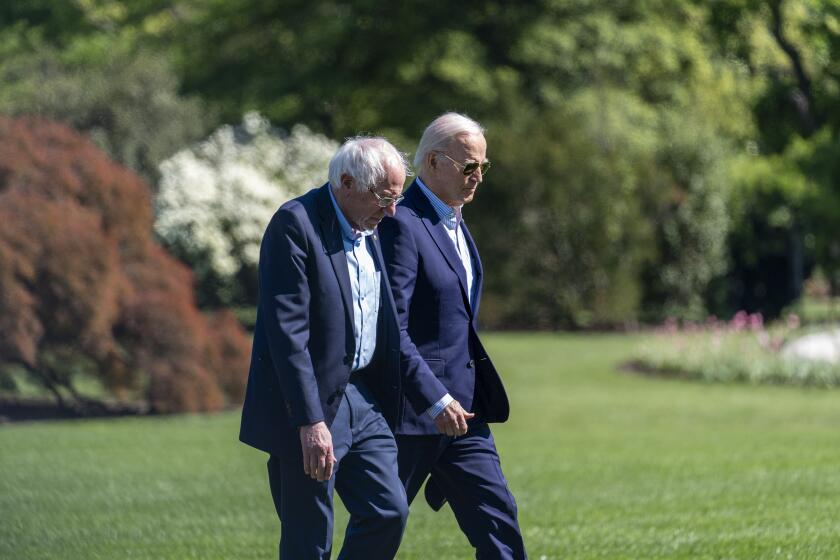House Panel Backs Immunity for Milken, Boesky
A House committee voted Thursday to grant junk-bond financier Michael Milken and stock speculator Ivan F. Boesky immunity from additional prosecution in order to persuade them to testify before Congress.
The 42-1 vote by the full Energy and Commerce Committee means that nothing either of the two most famous figures in the Wall Street scandals of the 1980s tells Congress can be used against them in court.
The panel’s oversight and investigations subcommittee said it plans to call the two men as witnesses this fall as part of a general probe for ways to institute more control over the securities industry.
Before the vote, Rep. John D. Dingell (D-Mich.), chairman of both the committee and subcommittee, assured members that the immunity was proper because neither Boesky nor Milken were facing “pending criminal prosecution.”
Milken, the fired head of junk-bond operations at Drexel Burnham Lambert Inc., pleaded guilty in April to six felony counts of securities fraud and related charges and agreed to pay a record $600-million fine. He faces up to 28 years in prison in sentencing in New York, scheduled for Oct. 1.
Milken was linked to a large insider-trading network headed by Boesky. Once a leading speculator in the stock of potential takeover targets, Boesky pleaded guilty to one count of conspiracy to violate securities laws and was released April 4 after serving about two-thirds of a three-year prison sentence.
The vote in the committee Thursday came less than a week after a federal appeals court in Washington reversed some of the convictions against Iran-Contra figure Oliver North, raising serious questions about testimony provided under immunity granted by Congress.
The appeals court ruled that congressional testimony, such as that given by North in the summer of 1987, could “seep” from the congressional forum and unfairly prejudice a defendant’s trial.
The committee’s vote appeared to represent a compromise in a tug-of-war between the Justice Department, which does not want Milken to testify before he is sentenced, and Dingell, who wants to chronicle a series of junk-bond transactions for which Milken was not prosecuted.
Justice Department sources said prosecutors were concerned that Milken could withdraw his guilty plea after being immunized, making it difficult--if not impossible--for any prosecution to continue.
Dingell said the U.S. Attorney’s Office in New York asked the subcommittee not to take Milken’s testimony until after the sentencing. Congressional sources said Dingell agreed.
A spokesman for Milken said: “Of course, we will testify when they ask him to testify.”
The Justice Department and the Securities and Exchange Commission hope to use information supplied by Milken to pursue civil and criminal prosecutions in connection with the 1980s takeover wave.
Prosecutors are particularly interested in pursuing top officials at several large, failed or troubled thrifts that invested heavily in junk bonds. They believe that Milken traded junk bonds on behalf of several troubled thrifts in a buy-and-sell strategy that artificially inflated the price of the bonds, the sources say.
Among thrifts that invested heavily in junk bonds are Columbia Savings in Beverly Hills, Lincoln Savings in Irvine, and Centrust Savings in Miami. Lincoln and Centrust alone are expected to cost taxpayers more than $5 billion. As junk bonds plummeted over the past 18 months, many thrifts that invested heavily in them failed, leaving taxpayers holding securities in such risky ventures as Greyhound Lines, Eastern Airlines and Drexel itself.
Boesky, meanwhile, has agreed to extensive subcommittee staff interviews before his actual testimony. Milken had not agreed to such interviews, Dingell said.
Dingell wants to know about some 500 limited partnerships--set up by Milken and Drexel--that bought significant stakes in hot junk-bond issues underwritten by Drexel before they were made available to the public.
Critics say the activity drove up the price of those issues at the expense of Drexel customers, but the legality of the transactions has never been resolved.
Milken was called to testify before the investigations subcommittee in 1988, but invoked his Fifth Amendment right against possible self-incrimination. A subpoena was authorized then for Boesky too, but never was issued pending the outcome of the Milken probe.
The lone dissent in the committee vote Thursday came from Rep. Joe Barton (R-Tex.). Barton’s spokesman, Craig Murphy, said the congressman “does not believe in giving immunity to convicted felons.”
With reports from Times wire services.
More to Read
Get the L.A. Times Politics newsletter
Deeply reported insights into legislation, politics and policy from Sacramento, Washington and beyond. In your inbox three times per week.
You may occasionally receive promotional content from the Los Angeles Times.






